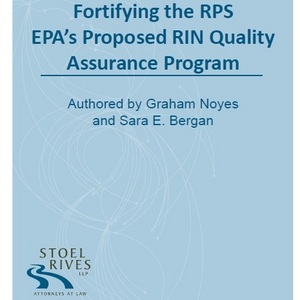Stoel Rives provides overview of proposed RIN integrity program




Stoel Rives LLP
March 5, 2013
BY Erin Krueger
Stoel Rives LLP has published a white paper that provides a comprehensive overview of the U.S. EPA’s proposed rules for a voluntary renewable identification number (RIN) integrity program. The proposed rule was published in the Federal Register on Feb. 21. A hearing on the proposed rule is scheduled for March 19, with public comments accepted through April 18.
According to Stoel Rives, the EPA has emphasized that portions of the proposed rules, including new affirmative defense provisions, will apply retroactively from Jan. 1. “Stoel Rives attorneys present their white paper as background for those who need to plan for compliance now and those who may want to submit testimony,” said the law firm in a statement.
Advertisement
Advertisement
The EPA’s RIN program initially adopted a “buyer beware” approach to invalid RINs, imposing liability on obligated parties that transferred or used invalid RINs. Stoel Rives points out that the original approach failed to prevent significant numbers of invalid RINs from entering the marketplace. While the problems with invalid RINs that prompted the new proposed rule from the EPA have been primarily related to invalid biodiesel RINs, the proposed voluntary integrity program could be applicable to all RINs generated under the renewable fuel standard (RFS) program.
According to the white paper, EPA’s proposed rule should make RINs more fungible and liquid, thereby serving as a foundation for more robust RIN trading and a more effective RFS program. The rulemaking would maintain an underlying buyer beware approach, and provides two different options that would establish minimum requirements for RIN quality assurance. Stoel Rives notes that the tracks would also provide the basis for an affirmative defense if RINs were found to be invalidly generated. According to the white paper, each track includes provisions for third-party quality assurance programs. The requirements for Option A are more detailed and provide a stronger affirmative defense. Option B is less stringent, providing affirmative defense but leaving replacement of invalid RINs a responsibility of obligated parties. The rulemaking also creations three options for obligated parties, each designed for a different level of risk tolerance.
In addition to providing a description of each option track, the white paper also points out several other issues raised by the rulemaking, such as auditor qualifications and tracking of verified RINs. With regard to RIN separation, the white paper points out that the EPA is seeking comments on whether or not it should negate the ability of biofuel producers to separate RINs.
Advertisement
Advertisement
A full copy of the white paper, titled “Fortifying the RPS EPA’s Proposed RIN Qualification Assurance Program,” is available for download on the Stoel Rives website. The document was authored by attorneys Graham Noyes and Sara E. Bergan.
Upcoming Events





